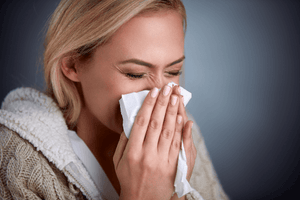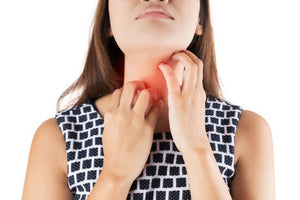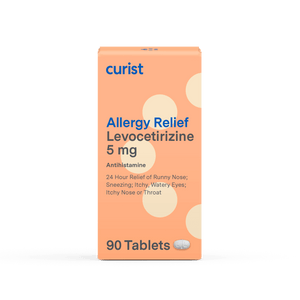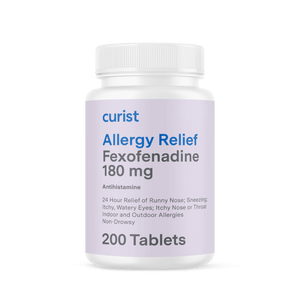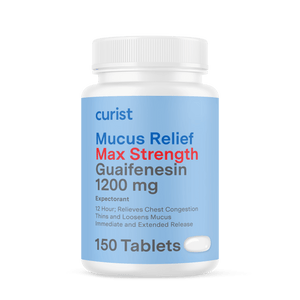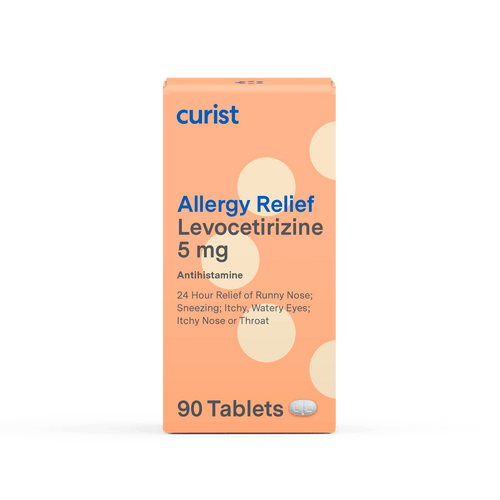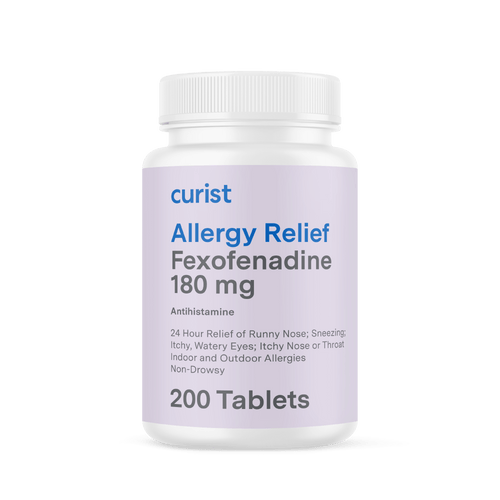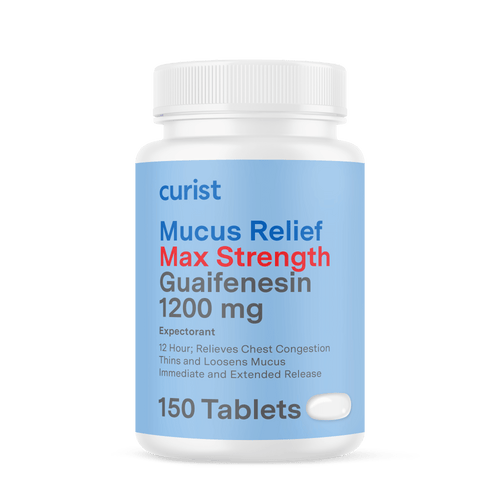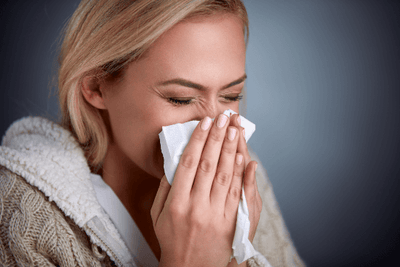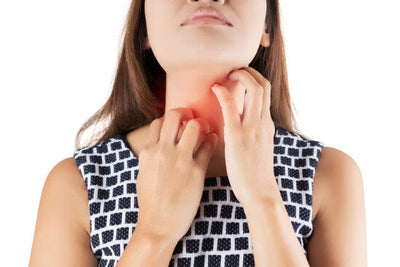Curist delivers over-the-counter medicines to your door at a fraction of the price of traditional brands. We hope everyone stays safe and healthy during this time.
There are several causes to an itchy roof of the mouth, depending on what other symptoms accompany it, how quickly symptoms appear, and what you have been exposed to recently. This article can help you identify the cause of your itchy roof of your mouth and options available to help you treat it!
Why Do I Have an Itchy Roof of Mouth?
If the top of your mouth, also known as the palate, is itchy, there are primarily 3 causes: allergies, cold, or infection. Here are signs of each causes of itchy top of mouth:
- Allergies: If the symptoms are predictable because they come around the same season and you also experience sneezing, congestion, or watery eyes, seasonal allergies are likely causing your itchy roof of mouth. Alternatively, if the symptoms start after certain meals, and you also get itchy red rashes, facial swelling or difficulty breathing, your itchy roof of mouth may be due to food allergies or be the result of oral allergy syndrome (OAS).
- Common Cold: If your itchy roof of mouth comes slowly with constant sneezing, sore throat, low-grade fever, cough, and general body aches, then your itchy roof of mouth is likely due to the common cold.
- Infection: If you notice bumps inside your mouth along with your itchy top of mouth, it may be due to oral thrush and require an appointment with your doctor or dentist.
Get COVID-19 testing if you think it may be causing your itchy roof of mouth, and contact a doctor if symptoms worsen.
Is My Itchy Roof of Mouth From Allergies? Is My Itchy Top of Mouth From Food Allergies?
There are two ways that allergies can cause an itchy roof of the mouth:
- Seasonal Allergies: If the symptoms occur around the same time each year for several weeks and are accompanied by sneezing, congestion, itchy nose, itchy throat, itchy nose, watery eyes, seasonal allergies are likely causing your itchy roof of mouth. Oftentimes, breathing in outdoor allergens such as pollen, mold, or smoke can irritate our bodies and cause our immune system to react. Depending on what allergens in the air, seasonal allergies typically peak in the spring and fall. To reduce your exposure and symptoms, limit early morning activities between 5-10 AM, keep windows closed, and wear a mask while outdoors, if possible. Additionally, you can use antihistamines like Curist Allergy Relief (levocetirizine) or nasal sprays such as Curist Allergy Nasal Spray (fluticasone propionate 50 mcg) at least 1 week before symptoms typically occur to help with allergy symptoms.
- Food Allergies: Alternatively, if the symptoms occur throughout the year and begin after meals, accompanied by itchy red rashes, itchy tongue, facial swelling or difficulty breathing, your itchy roof of mouth may be due to food allergies. Common food allergies include peanuts, shellfish, fruits, eggs, and fish. If your roof of mouth is itchy after a meal, check the ingredients of any foods you have recently eaten if possible and make someone aware of the situation. If the symptoms of itchy top of mouth are mild, you can closely monitor your symptoms; however, if your reactions are more severe, you should have your doctor prescribe an Epipen (Epinephrine Auto-Injector) for you to use in an allergic emergency and seek medical attention immediately. Furthermore, you can be tested for environmental and food allergies with an allergist or keep a food journal to help you identify foods to avoid.
Is My Itchy Roof of Mouth From COVID?
Itchy roof of mouth is not a common symptom of COVID-19. Common coronavirus symptoms include fever (> 100℉), cough, and shortness of breath within 2-14 days of a suspected exposure to COVID-19. As more information has been collected during the pandemic, the CDC has also added loss of smell or taste, chills, headaches, nausea or vomiting to the list of COVID-19 symptoms.
Recently, a team of researchers conducted a study with 21 COVID patients in Spain who also had skin rashes to see if they would develop enanthem, or rashes in the mouth. Eventually, 6 adults of the 21 developed itchy rashes on the roof of their mouths. They concluded that these rashes were likely due to the viral infection rather than an adverse reaction to drug therapy, but at this time, itchy roof of mouth is not currently on the CDC list of COVID-19 symptoms.
Understanding the difference between allergies and COVID symptoms may also help you determine what is causing your itchy mouth.
Is My Itchy Roof of Mouth From a Cold?
If your itchy roof of mouth comes gradually and you also experience a sore throat, sneezing, low-grade fever, cough, and general aches or pains over the course of 3-10 days, then your itchy roof of mouth is likely due to the common cold. Generally, you should rest, drink plenty of water, and eat nutritious foods. Additionally, you can use Curist Mucus Relief to relieve cold symptoms, and use a humidifier and cough drops/lozenges to minimize coughing. Usually, a cold will resolve itself within 2 weeks. Symptoms of a cold do overlap with allergies, so understanding the difference between colds and allergies will also help determine the root cause of your itchy roof of mouth.
Is My Itchy Roof of Mouth From a Fungal Infection or Oral Thrush?
If you look in your mouth and notice white or yellow bumps with a residue, inflamed tissues, and an itchy roof of mouth, this may indicate that you have a fungal infection. Furthermore, if you have a weakened immune system from cancer or organ transplants, uncontrolled diabetes, or recently used antibiotics, this can increase your chance of a fungal infection. Commonly this is known as oral thrush and will require you to see a doctor or dentist for additional treatment.
What Does it Mean if My Roof of Mouth and Ears are Itchy?
If the roof of your mouth and ears are itchy, you could be experiencing hay fever, a type of seasonal allergy. Interestingly, this does not mean you were exposed to hay and usually does not include a fever. Instead, this likely means you are allergic to pollen, dust, mold, or smoke, which can be more present during certain seasons. These allergens can cause itchy mouth and itchy ears, congestion, sneezing, and fatigue. In this case, you can use decongestants or antihistamines such as Curist Allergy Relief (levocetirizine) to lessen these allergy symptoms.
What Does it Mean if My Top of Mouth is Itchy and I’m Sneezing?
If you are sneezing and have an itchy roof of mouth, this can be due to allergies or a cold. If the symptoms last for less than 2 weeks, then you likely have a cold which should resolve with plenty of rest, hydration, and sleep. If your symptoms persist beyond 2 weeks and occur around the same time of the year, seasonal allergies may be causing these symptoms. You can use Curist Allergy Trinity at least 1 week before symptoms typically occur and during allergy season to help prevent allergy symptoms.
What’s the Best Treatment For Itchy Roof of Mouth? How To Stop the Top of Your Mouth From Itching?
There are several different options for treating an itchy roof of mouth depending on the cause.
Other treatment options for itchy roof of mouth include:
- Oral Thrush: In general, use good oral hygiene such as regularly brushing and flossing teeth, removing and cleansing dentures nightly, rinsing your mouth after using inhalers with corticosteroids, and consider smoking cessation. This can help prevent yeast infections known as oral thrush, which also usually causes white or yellow bumps inside the mouth.If you do have oral thrush, contact a doctor for an appointment as you may need antifungal medications.
- Allergies: If seasonal allergies caused itchy roof of mouth and mild symptoms, consider oral antihistamines such as the Curist Allergy Relief and non-medical allergy prevention tips.
- Anaphylaxis: If an itchy roof of mouth occurs with severe anaphylaxis symptoms like difficulty breathing, facial swelling, rapid heartbeat, or loss of consciousness, use an EpiPen and seek emergency medical attention.
- Cold: If a cold caused your itchy roof of mouth, the symptoms should resolve within 2 weeks, but you can use Curist Mucus Relief Max to help reduce congestion and mucus in the meantime. Additionally, rest and drink fluids!
- COVID-19: If you suspect COVID-19 is causing your itchy roof of mouth, get tested and contact a doctor if necessary.

